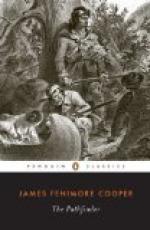Captain Sanglier, Arrowhead, and June alone remained, when this disposition had been made of the rest of the party: the former having certain papers to draw up and sign with Lieutenant Muir, who in his eyes possessed the virtues which are attached to a commission; and the latter preferring, for reasons of his own, not to depart in company with his late friends, the Iroquois. Canoes were detained for the departure of these three, when the proper moment should arrive.
In the meantime, or while the Scud was running down with the boats in tow, Pathfinder and Cap, aided by proper assistants, busied themselves with preparing a breakfast; most of the party not having eaten for four-and-twenty hours. The brief space that passed in this manner before the Scud came-to again was little interrupted by discourse, though Pathfinder found leisure to pay a visit to the Sergeant, to say a few friendly words to Mabel, and to give such directions as he thought might smooth the passage of the dying man. As for Mabel herself, he insisted on her taking some light refreshment; and, there no longer existing any motive for keeping it there, he had the guard removed from the block, in order that the daughter might have no impediment to her attentions to her father. These little arrangements completed, our hero returned to the fire, around which he found all the remainder of the party assembled, including Jasper.
CHAPTER XXVI.
You saw but sorrow in its waning form;
A working sea remaining from a storm,
Where now the weary waves roll o’er the deep,
And faintly murmur ere they fall asleep.
DRYDEN.
Men accustomed to a warfare like that we have been describing are not apt to be much under the influence of the tender feelings while still in the field. Notwithstanding their habits, however, more than one heart was with Mabel in the block, while the incidents we are about to relate were in the course of occurrence; and even the indispensable meal was less relished by the hardiest of the soldiers than it might have been had not the Sergeant been so near his end.
As Pathfinder returned from the block, he was met by Muir, who led him aside in order to hold a private discourse. The manner of the Quartermaster had that air of supererogatory courtesy about it which almost invariably denotes artifice; for, while physiognomy and phrenology are but lame sciences at the best, and perhaps lead to as many false as right conclusions, we hold that there is no more infallible evidence of insincerity of purpose, short of overt acts, than a face that smiles when there is no occasion, and the tongue that is out of measure smooth. Muir had much of this manner in common, mingled with an apparent frankness that his Scottish intonation of voice, Scottish accent, and Scottish modes of expression were singularly adapted to sustain. He owed his preferment, indeed,




